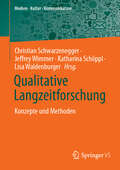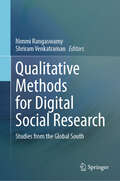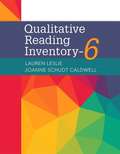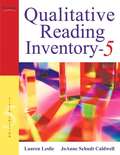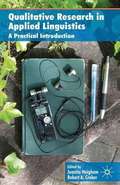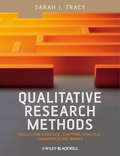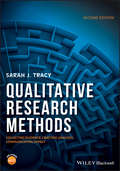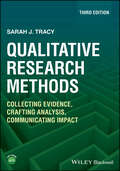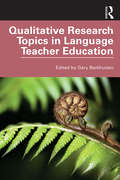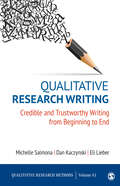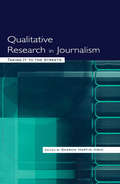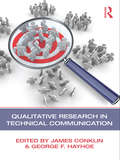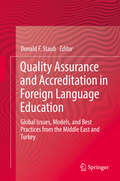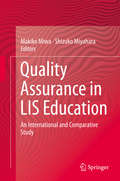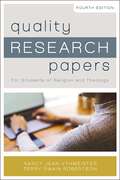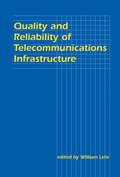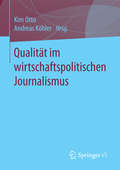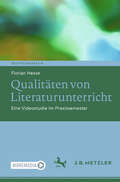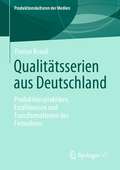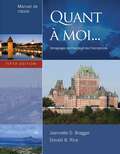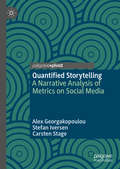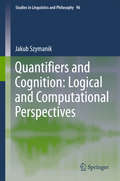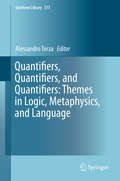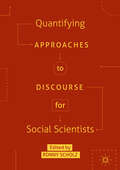- Table View
- List View
Qualitative Langzeitforschung: Konzepte und Methoden (Medien • Kultur • Kommunikation)
by Jeffrey Wimmer Christian Schwarzenegger Lisa Waldenburger Katharina SchöpplQualitative Langzeitforschung ist in Zeiten tiefgreifender gesellschaftlicher und medialer Wandlungsprozesse von essenzieller Bedeutung Der Sammelband adressieret zentrale methodologische und methodische Fragestellungen und zeigt auf, wie den vielfältigen Herausforderungen begegnet werden kann. Insgesamt versteht er sich als ein ‚Kaleidoskop an Lösungsansätzen und Innovationen, welches Forschenden, die qualitativ im Längsschnitt arbeiten, als diskursive Hilfestellung dienen soll.
Qualitative Methods for Digital Social Research: Studies from the Global South
by Nimmi Rangaswamy Shriram VenkatramanThis volume offers a series of practical methods to study digital behaviours considering the socio-cultural realities of the global south. It includes methodologically rigorous applied research chapters from leading international researchers offering information on gold mines and blind spots in researching the digital in the global south. It develops a tri-sectional format based on distinct areas of research, geographical variability and diversity of methods and approaches. The first section focuses on Dissecting Research Fractures – which disrupts the established research ideologies and practices, user behaviors, theoretical perspectives, and field methods in the study of digital social research . The second section on Innovating Methods proposes and extends mixed methodologies that go beyond research boundaries to produce novel possibilities for study. The final section on Re-Imagining the Field breaks new ground in exploring the social-digital where a transient research field is contextualized and stabilized through the social, infrastructural, and digital interweaving. The book offers the reader an inside view of studying marginal yet emerging users and consumers of digital technologies. The three sections together purport to draw textual, graphical, temporal, and ethnographic insights via innovative and hybrid observational tools to record, annotate and formulate everyday experiences of digital life. The volume addresses scholars interested in hybridizing methods, early career researchers, and graduates working on connecting humans and digital technologies. It also holds considerable appeal for digital marketers and strategists, offering practically applicable methods to study digital life.
Qualitative Reading Inventory
by Lauren Leslie JoAnne CaldwellThe QRI-6 continues to emphasize the authentic assessment of children’s reading abilities–from the earliest emergent readers to advanced readers. This popular resource provides graded word lists and numerous passages designed to assess a student’s oral reading accuracy, rate of reading, and comprehension of passage read orally and silently. Several unique features set it apart from other resources in the field, including narrative and expository passages at each level from pre-primer through high school, as well as all self-contained selections being highly representative of the structure and topics of materials found in basal readers and content-area textbooks. For example, passages at the pre-primer through second grade levels are presented with pictures, and maps and illustrations are part of the expository selections at fourth grade through high school levels. <p><p> The QRI-6 measures comprehension in several ways that allow an examiner to label a passage as familiar or unfamiliar to each student: by analyzing the student’s retelling or summarization; by looking at the student’s answers to explicit and implicit comprehension questions; through the answers to complex inference questions recommended by the Common Core State Standards; through the use of look-backs, which separate what readers remember from what they comprehend; and through the use of think-alouds at the sixth grade level and above to analyze the student’s thoughts during reading. These measurement tools presented in the QRI-6 contribute to its widespread popularity as a superb informal reading inventory.
Qualitative Reading Inventory (5th Edition)
by Lauren Leslie Joanne Schudt CaldwellThis fifth edition emphasizes authentic assessment of children's reading abilities, from the most emergent readers to advanced readers.
Qualitative Research In Applied Linguistics: A Practical Introduction
by Juanita Heigham Robert A. CrokerUsing a reader-friendly, structured approach, Qualitative Research in Applied Linguistics: A Practical Introduction presents an easy-to-follow and straightforward guide to qualitative inquiry. Written by leading authors in a clear, informal style, it is an essential companion for graduate students and practicing teachers embarking on their first qualitative research study in applied linguistics. The ten central chapters introduce core qualitative research approaches and commonly used data collection methods. Each of these chapters offers: - A comprehensive guide to help you understand and use each approach or method - An illustrative example from applied linguistics research to help you see the approach or method 'in action' - A succinct outline of how you can avoid common mistakes and improve the quality of your research - Discussion questions and tasks to give you hands-on experience working with each research approach or data collection method Additional chapters offer engaging introductions to the qualitative research cycle, ethics, and writing up your research. There is also a glossary of important key words. This book has been carefully written to provide you with the essential research knowledge, skills - and confidence - you need to begin your qualitative research project.
Qualitative Research Methods
by Sarah J. TracyQualitative Research Methods is a comprehensive, all-inclusive resource for the theory and practice of qualitative/ethnographic research methodology.Serves as a "how-to" guide for qualitative/ethnographic research, detailing how to design a project, conduct interviews and focus groups, interpret and analyze data, and represent it in a compelling mannerDemonstrates how qualitative data can be systematically utilized to address pressing personal, organizational, and social problemsWritten in an engaging style, with in-depth examples from the author's own practiceComprehensive companion website includes sample syllabi, lesson plans, a list of helpful website links, test bank and exam review materials, and exercises and worksheets, available upon publication at www.wiley.com/go/tracy
Qualitative Research Methods: Collecting Evidence, Crafting Analysis, Communicating Impact
by Sarah J. TracyThe definitive step-by step resource for qualitative and ethnographic research Qualitative Research Methods: Collecting Evidence, Crafting Analysis, Communicating Impact is a comprehensive guide on both the theoretical foundations and practical application of qualitative methodology. Adopting a phronetic-iterative approach, this foundational book leads readers through the chronological progression of a qualitative research project, from designing a study and collecting and analyzing data to developing theories and effectively communicating the results—allowing readers to employ qualitative methods in their projects as they follow each chapter. Coverage of topics such as qualitative theories, ethics, sampling, interview techniques, qualitative quality, and advice on practical fieldwork provides clear and concise guidance on how to design and conduct sound research projects. Easy-to-follow instructions on iterative qualitative data analysis explain how to organize, code, interpret, make claims, and build theory. Throughout, the author offers her own backstage stories about fieldwork, analysis, drafting, writing, and publishing, revealing the emotional and humorous aspects of practicing qualitative methods. Now in its second edition, this thorough and informative text includes new and expanded sections on topics including post-qualitative research, phenomenology, textual analysis and cultural studies, gaining access to elite and difficult to access populations, on persuasive writing, novel interviewing approaches, and more. Numerous examples, case studies, activities, and discussion questions have been updated to reflect current research and ensure contemporary relevance. Written in an engaging and accessible narrative style by an acclaimed scholar and researcher in the field Offers new and updated examples of coding and qualitative analysis, full-color photos and illustrations, and a companion instructor website Synthesizes the most up-to-date multidisciplinary literature on qualitative research methods including seven main approaches to qualitative inquiry: grounded theory, case study, ethnography, phenomenology, narrative and autoethnography, participatory action research, and arts-based research Presents innovative qualitative data collection methods and modern representation strategies, such as virtual ethnography, photo-voice, and mobile interviewing Qualitative Research Methods: Collecting Evidence, Crafting Analysis, Communicating Impact is an ideal resource for undergraduate and graduate students, instructors, and faculty across multiple disciplines including the social sciences, healthcare, education, management, and the humanities, and for practitioners seeking expert guidance on practical qualitative methods.
Qualitative Research Methods: Collecting Evidence, Crafting Analysis, Communicating Impact
by Sarah J. TracyStep-by-step advice for constructing a qualitative project from beginning to end, covering both foundational theory and real-world application Qualitative Research Methods: Collecting Evidence, Crafting Analysis, Communicating Impact guides you through sequential stages of a qualitative research project, from project design and data collection to analysis, interpretation, and presentation. Drawing on her background in qualitative research methods and human communication, Sarah J. Tracy shares personal and backstage stories while showing you how to code data, craft meaningful claims, develop theoretical explanations, and communicate research that impacts key stakeholders. Employing a practical, problem-based contextual approach, the third edition of Qualitative Research Methods incorporates developments in textual, media, visual, arts-based, and digital analysis. New coverage includes social media data-scraping techniques, AI and ChatGPT, fieldwork and interviewing, digital ethnography, working with neurodivergent populations, adopting digital and traditional archival approaches, and much more. This edition includes a wealth of new examples, case studies, discussion questions, full-color visuals, and hands-on “Project Building Blocks” activities you can use at any stage of your qualitative research project. Supported by a companion website containing extensive teaching and learning tools, Qualitative Research Methods: Collecting Evidence, Crafting Analysis, Communicating Impact is an indispensable resource for undergraduates, graduate students, and faculty across multiple disciplines, as well as researchers, ethnographers, and user experience professionals looking to hone their methodological practice.
Qualitative Research Topics in Language Teacher Education
by Gary BarkhuizenStudent and novice researchers may have a general idea for a topic they would like to research, but have a difficult time settling on a more specific topic and its associated research questions. Addressing this problem, this book features contributions from over thirty diverse and experienced research supervisors, mentors, and principal investigators in the field of language teacher education. The chapters are autobiographic in nature, with each contributing author reflecting on relevant, current and innovative research topics through the lens of their own professional life and research work. Offering explicit research topics and strategies for each area of expertise, this book will serve as a useful reference for the seasoned qualitative or narrative researcher, and a helpful guide for new researchers and teacher researchers narrowing down their own research topics.
Qualitative Research Writing: Credible and Trustworthy Writing from Beginning to End (Qualitative Research Methods)
by Dan Kaczynski Michelle Salmona Eli LieberFinding your academic voice to tell a strong story about your research is a difficult hurdle for many qualitative writers. Qualitative Research Writing: Credible and Trustworthy Writing from Beginning to End takes you through the writing process, starting with how you think about your research and building towards presenting credible and trustworthy work. Authors Michelle Salmona, Dan Kaczynski, and Eli Lieber offer practical guidance based on over two decades working with faculty and doctoral students. By integrating digital tools and qualitative research steps into the writing process, readers will seamlessly move from the research process to writing. This brief text will help writers make sound arguments and develop their authorial voices to build connections between themselves and their intended audience.
Qualitative Research Writing: Credible and Trustworthy Writing from Beginning to End (Qualitative Research Methods)
by Dan Kaczynski Michelle Salmona Eli LieberFinding your academic voice to tell a strong story about your research is a difficult hurdle for many qualitative writers. Qualitative Research Writing: Credible and Trustworthy Writing from Beginning to End takes you through the writing process, starting with how you think about your research and building towards presenting credible and trustworthy work. Authors Michelle Salmona, Dan Kaczynski, and Eli Lieber offer practical guidance based on over two decades working with faculty and doctoral students. By integrating digital tools and qualitative research steps into the writing process, readers will seamlessly move from the research process to writing. This brief text will help writers make sound arguments and develop their authorial voices to build connections between themselves and their intended audience.
Qualitative Research in Journalism: Taking It to the Streets
by Sharon Hartin IorioThis volume highlights the integration of qualitative research methods into traditional journalism, offering new ways of expanding and enhancing news coverage. Designed for readers without prior experience in social science research, this collection presents a wide variety of qualitative techniques and their applications in journalistic practice. The work brings together contributions from professional journalists and journalism scholars who are highly experienced in conducting qualitative research. These experts demonstrate how valid, reliable qualitative procedures can be used to increase coverage and offer new insights. Written in a straightforward, reader-friendly style, features in this volume include: *real-world examples from contemporary newsrooms and interviews with practicing journalists who use the techniques of qualitative research in reporting; *a rationale for the use of qualitative methods in journalism, with an illustration of how various qualitative methods tie together; *step-by-step instructions for applying each methodology; *a solid foundation for understanding the history and theory behind qualitative research and its usefulness in journalism; *chapters on pairing qualitative and quantitative methods in journalism and on detailing partnerships between academics and professional journalists to facilitate newsroom research and reporting; and *a discussion of "objectivity" in qualitative research and in journalism that offers an ethic for journalists of today. The methodologies covered here include oral and life histories, textual analysis, focused interviews, ethnographies, focus groups, and case studies. In addition, a recently developed technique, civic mapping, is presented as a qualitative tool for reporting. Qualitative Research in Journalism is an indispensable resource for current and future journalists interested in enhancing their coverage of the news.
Qualitative Research in Technical Communication
by James Conklin George F. HayhoeAddressing the explosive growth in qualitative research in recent years, this volume represents the first anthology to bring together a representative sample from this growing body of work, and comments on the reasons for the extraordinary interest in qualitative research. Contributors to the volume bring forward reports of significant, structured qualitative research into various aspects of technical communication practice, addressing the questions of what new insights researchers are generating about the working reality of today’s technical communicators, and how technical communicators are perceived and treated by managers and by colleagues from other disciplines. Including examples of qualitative methodologies—including ethnography, case study, focus groups, action research, grounded theory, and interview research— used by technical communicators to strengthen their practice, the result is a rich harmony of perspectives, as diverse as the field of technical communication itself. This book will be of interest to to students and academics seeking up-to-date information on current industry practices in technical communication, as well as to practitioners in technical and professional communication. The book will also serve as a text in undergraduate seminars and courses at the master’s level.
Quality Assurance and Accreditation in Foreign Language Education: Global Issues, Models, and Best Practices from the Middle East and Turkey
by Donald F. StaubGreater student mobility, increasing demand for access to tertiary education, as well as policy changes have spurred rapid expansion of the global higher education sector. However, with increased demand comes considerable variation in the quality of the supply. As higher education is an expensive endeavor for all stakeholders – governments, funders, employers, and families – there are also increasing expectations for accountability and demonstrations of quality. English as a foreign language (EFL) programs, in particular, are under considerable pressure to substantiate their value, resulting in a significant rise in interest around their quality. This volume is the outcome of a May 2018 international conference on quality and specialized accreditation, held in Turkey. The book’s three sections take the reader from the global to the program level, examining trends and best practices in quality assurance and accreditation in EFL programs. The book’s geographic focus is primarily the Middle East and Turkey, yet the issues discussed herein a quite global in nature. This volume will be of interest to educational administrators at the institutional or program level, educational leadership programs focusing on higher education, language teacher preparation programs, and administrators in centralized education systems or accrediting organizations.
Quality Assurance in LIS Education
by Makiko Miwa Shizuko MiyaharaThis book reviews and examines the quality assurance systems of Library and Information Science (LIS) education in a variety countries and regions, including Asia, North America, Latin America and Europe Globalization of education has caused the number of LIS professionals working in every region of the world to increase greatly In order to be qualified as an LIS professional worldwide as well as in a local area, it is imperative that there exists a global standard of quality assurance systems for LIS practitioners This book provides such a standard and ranks specific systems and educational programs worldwide With contributions from leading researchers and scholars in a variety of regions across the globe, this book will prove an invaluable resource for professionals and educators of LIS education
Quality Research Papers: For Students of Religion and Theology
by Nancy Jean Vyhmeister Terry Dwain RobertsonThis will be the fourth edition of a time-tested resource for students writing papers in the fields of religion and theology. It provides essential guidance for writing assignments typical in graduate programs in religion and has served as a standard textbook for seminary research courses. The fourth edition is updated to include information on Turabian 9th edition, SBL Handbook 2nd edition, new resource lists, and additional help with online resources and formatting issues.Most importantly, this new edition is revised from the perspective of information abundance rather than information scarcity. Today's research mindset has shifted from "find anything" and "be satisfied with anything" to "choose intentionally" reliable and credible sources. Quality Research Papers will guide students through an overabundance of online and library resources and help them craft excellent essays.
Quality and Reliability of Telecommunications Infrastructure: Quality And Reliability Of Telecommunications Infrastructure (LEA Telecommunications Series)
by William LehrIn the last decade, the technology, regulation, and industry structure of our information infrastructure (telephone services, cable and broadcast television, and myriad new data and information services) have changed dramatically. Since the break-up of AT&T's Bell System monopoly, telephone services in the United States are no longer purchased from a single firm. Advances in fiber optics, wireless communications and software-controlled switching are changing how communication services are provided. As the global economy grows more dependent on a hybrid mix of interconnected networks, public officials in the US and abroad are relinquishing control of the market. All of these changes are affecting the quality and reliability of the telecommunications infrastructure, but informed discussions of the public policy and economic issues are scarce. Deregulation and increased competition have lowered prices, but have service quality and reliability suffered? Do advanced network technologies which make it possible to offer a dizzying array of new services increase vulnerability to system-wide failures? Who should or is likely to bear the costs of increased -- or decreased -- service quality? This volume tackles the economic and public policy issues raised by these difficult questions for an audience of industry executives, scholars, and policymakers. Leading scholars and analysts examine such issues as the effects of network ownership on incentives to invest in quality improvements and/or strategies for quality-differentiated pricing in tomorrow's broadband, integrated networks. They analyze the quality of current telecommunications networks and the impact of re-regulation on cable television quality. The contributions range from new microeconomic theory to new empirical research. As such, the volume makes a valuable contribution to the public debate on network quality and reliability. It will be useful both as an introduction to newcomers and as a resource for more experienced researchers. As regulatory, industry and national barriers to integrated communications fall, these issues are likely to become even more important. The research presented here provides a solid foundation for further discussion.
Qualität im wirtschaftspolitischen Journalismus
by Andreas Köhler Kim OttoDieses Buch fasst die aktuelle Diskussion um die Qualität des wirtschaftspolitischen Journalismus zusammen. Ausgehend von den Herausforderungen eines zunehmend komplexeren und globalisierten Berichterstattungsfeldes Wirtschaft werden Anforderungen an den wirtschaftspolitischen Journalismus formuliert. Aufbauend auf diesen theoretischen Herausforderungen werden Strategien der Qualitätssicherung in deutschen Wirtschaftsredaktionen von deren Vertretern vorgestellt und Beispiele qualitativ hochwertigen wirtschaftspolitischen Journalismus‘ von Journalistinnen undJournalisten aus der Praxis dargestellt. Damit gibt der Band einen Überblick über theoretische Anforderungen, Strategien und Beispiele in der journalistischen Praxis.
Qualitäten von Literaturunterricht: Eine Videostudie im Praxissemester (Deutschdidaktik)
by Florian HesseWie gestalten Studierende im Praxissemester Literaturunterricht? Dieser Frage widmet sich Florian Hesse in einer explorativen Videostudie. Basierend auf Erkenntnissen der Unterrichts-, Professionalisierungs- und Praktikumsforschung entwickelt er ein Qualitätsmodell für den Literaturunterricht, welches die Grundlage für die Konzeption und Evaluation von Beobachtungsinstrumenten darstellt. Mit diesen wird der Unterricht mehrperspektivisch beschrieben und hinsichtlich seiner Qualität eingeschätzt. Aus den Befunden werden Hypothesen für die weitere Forschung abgeleitet und Schlussfolgerungen für die Lehrkräftebildung gezogen.
Qualitätsserien aus Deutschland: Produktionspraktiken, Erzählweisen und Transformationen des Fernsehens (Produktionskulturen der Medien)
by Florian KraußDas Buch untersucht, wie die Fernsehschaffenden in Deutschland sogenannten Qualitätsfernsehserien von 2015 bis heute entwickeln. Dabei ist die zentrale Hypothese, dass diese Praktiker das Qualitätsfernsehen, das am stärksten mit dem Serien-Drama aus den USA assoziiert wird, in einen nationalen Kontext übertragen und gleichzeitig dieses Konzept mit breiteren, jüngeren Transformationen des Fernsehens und der lokalen Fernsehindustrie verbinden.
Quant a moi
by Jeannette D. Bragger Donald B. RiceStructured for student success and organized for instructional flexibility, QUANT A MOI...: TÉMOIGNAGES DES FRANÇAIS ET DES FRANCOPHONES, 5th Edition is written for intermediate courses that emphasize meaningful in-class communication and in-depth exploration of Francophone cultures. Thoroughly updated, the Fifth Edition offers an easy-to-follow structure that facilitates lesson planning and ease of progression through each chapter. The accompanying MANUEL DE PRÉPARATION offers independent grammar review and practice, allowing class time to be devoted to the culturally rich communicative activities found in the student textbook, MANUEL DE CLASSE. The new edition includes engaging new cultural readings.
Quantified Storytelling: A Narrative Analysis of Metrics on Social Media
by Carsten Stage Alex Georgakopoulou Stefan IversenThis book interrogates the role of quantification in stories on social media: how do visible numbers (e.g. of views, shares, likes) and invisible algorithmic measurements shape the stories we post and engage with? The links of quantification with stories have not been explored sufficiently in storytelling research or in social media studies, despite the fact that platforms have been integrating sophisticated metrics into developing facilities for sharing stories, with a massive appeal to ordinary users, influencers and businesses alike. With case-studies from Instagram, Reddit and Snapchat, the authors show how three types of metrics, namely content metrics, interface metrics and algorithmic metrics, affect the ways in which cancer patients share their experiences, the circulation of specific stories that mobilize counter-publics and the design of stories as facilities on platforms. The analyses document how numbers structure elements in stories, indicate and produce engagement and become resources for the tellers’ self-presentation. This book will be of interest to students and scholars working in the fields of narrative and social media studies, including narratology, biography studies, digital storytelling, life-writing, narrative psychology, sociological approaches to narrative, discourse and sociolinguistic perspectives.
Quantifiers and Cognition: Logical and Computational Perspectives
by Jakub SzymanikThis volume on the semantic complexity of natural language explores the question why some sentences are more difficult than others. While doing so, it lays the groundwork for extending semantic theory with computational and cognitive aspects by combining linguistics and logic with computations and cognition. Quantifier expressions occur whenever we describe the world and communicate about it. Generalized quantifier theory is therefore one of the basic tools of linguistics today, studying the possible meanings and the inferential power of quantifier expressions by logical means. The classic version was developed in the 1980s, at the interface of linguistics, mathematics and philosophy. Before this volume, advances in "classic" generalized quantifier theory mainly focused on logical questions and their applications to linguistics, this volume adds a computational component, the third pillar of language use and logical activity. This book is essential reading for researchers in linguistics, philosophy, cognitive science, logic, AI, and computer science.
Quantifiers, Quantifiers, and Quantifiers: Themes in Logic, Metaphysics, and Language
by Alessandro TorzaThis volume covers a wide range of topics that fall under the 'philosophy of quantifiers', a philosophy that spans across multiple areas such as logic, metaphysics, epistemology and even the history of philosophy. It discusses the import of quantifier variance in the model theory of mathematics. It advances an argument for the uniqueness of quantifier meaning in terms of Evert Beth's notion of implicit definition and clarifies the oldest explicit formulation of quantifier variance: the one proposed by Rudolf Carnap. The volume further examines what it means that a quantifier can have multiple meanings and addresses how existential vagueness can induce vagueness in our modal notions. Finally, the book explores the role played by quantifiers with respect to various kinds of semantic paradoxes, the logicality issue, ontological commitment, and the behavior of quantifiers in intensional contexts.
Quantifying Approaches to Discourse for Social Scientists (Postdisciplinary Studies in Discourse)
by Ronny ScholzThis book provides an overview of a range of quantitative methods, presenting a thorough analytical toolbox which will be of practical use to researchers across the social sciences as they face the challenges raised by new technology-driven language practices. The book is driven by a reflexive mind-set which views quantifying methods as complementary rather than in opposition to qualitative methods, and the chapters analyse a multitude of different intra- and extra-textual context levels essential for the understanding of how meaning is (re-)constructed in society. Uniting contributions from a range of national and disciplinary traditions, the chapters in this volume bring together state-of-the-art research from British, Canadian, French, German and Swiss authors representing the fields of Political Science, Sociology, Linguistics, Computer Science and Statistics. It will be of particular interest to discourse analysts, but also to other scholars working in the digital humanities and with big data of any kind.
